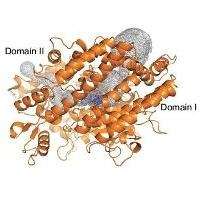Plant science could aid Alzheimer's research

A finding by an international team of plant biologists could be important in research into Alzheimer's and other age-related diseases.The study is published this week in the prestigious journal Proceedings of the National Academy of Sciences, and presents new data on the degradation of short peptides (chains of amino acid molecules) in cells.
The work is significant because it throws more light on the role of proteases, or enzymes, in disease in plants and animals, including humans.
The scientists identified and characterised a novel OligoPeptidase (OOP) from thale cress, a model organism often studied by molecular biologists. OOP degrades small peptides that are produced following the import of proteins into mitochondria and chloroplasts. Import of proteins into these organelles is essential for cellular function and the small peptides must be destroyed because they become toxic to the cell.
"The characterisation of these pathways for peptide degradation in model species is essential for understanding the role of proteases in disease in plants and animals", said Professor Jim Whelan of UWA and La Trobe.
Presequence Protease (PreP), which was also first extensively characterised in plants, has ability to degrade the peptide beta-amyloid that forms insoluble fibres in the brain of Alzheimer's patients.
"We believe the OOP and PreP co-operate to completely break down harmful peptides that accumulate and adversely affect mitochondrial activities," said Elzbieta Glaser, Professor of Biochemistry at the University of Stockholm.
"It will be very interesting to study the human variant of OOP, and examine its role in the degradation of amyloid-beta peptide. It may be of importance for research in Alzheimer's disease and other age-related diseases."
More information: www.pnas.org/content/early/201 … 637110.full.pdf+html
















